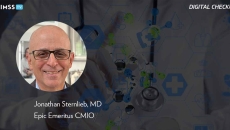Videos
Informatics and health IT are not synonymous but inextricably linked, says longtime informaticist Dr. Jonathan M. Sternlieb, who has been a clinician for 35 years.
Rochester Regional Health recently completed a pilot of an ambient digital scribe with 300 providers that will be implemented in the health system, says Dr. Everett Weiss, medical director for health informatics.
Cherish Health CEO Sumit Nagpal talks about how the company's radar-based monitoring system uses AI to detect daily patterns and falls, allowing seniors independence while giving families peace of mind.
The company recently partnered with UW Medicine and Alaska Airlines to move specialty medications from Seattle to Spokane, shortening the route, reducing time and packaging for home deliveries, says CEO Amit Gir.
It's becoming more critical for health systems to tie together analytics and artificial intelligence, says Karthik Raja, chief analytics and AI officer at Ascension.
Beyond administrative efficiencies, AI can help clinicians get the information they need as a strategy for their patient priorities, says Dr. Ami Bhatt, chief innovation officer at the American College of Cardiology.
Smaller scale workflows and ambient technologies are big everyday wins and the next move is toward clinical summarization, says Rachini Moosavi, chief analytics officer for UNC Health.
Bo Watson, a Tennessee state senator and physical therapist, says that, while AI tools can guide clinical decisions and increase operational efficiency, the ultimate responsibility for care rests with clinicians.
Resist the urge to think the EHR is good enough because there's always more value in the investment, says Dr. Michael Zaroukian, Epic Emeritus CMIO and a past chair of the HIMSS board of directors.
Rural hospitals were 30% less likely to offer obstetrics five years after being acquired, but more shocking was patient outcomes data, says Martin Gaynor, professor emeritus at Carnegie Mellon University.









